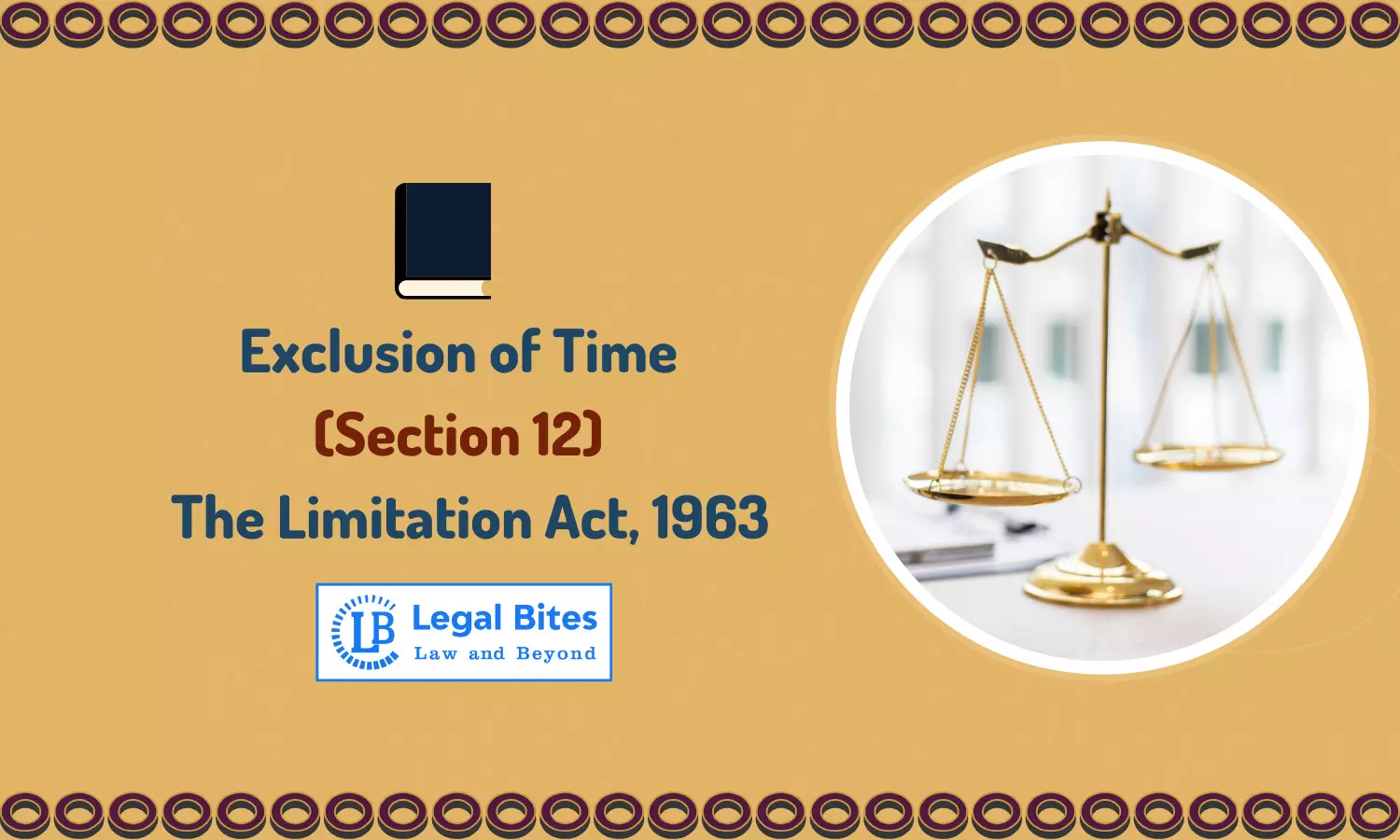Exclusion of Time (Section 12) | The Limitation Act, 1963
The article 'Exclusion of Time' takes a close, analytical look at Section 12 of the Limitation Act, 1963, emphasizing its fundamental importance in excluding particular timeframes from the calculation of limitation periods.

The article 'Exclusion of Time' takes a close, analytical look at Section 12 of the Limitation Act, 1963, emphasizing its fundamental importance in excluding particular timeframes from the calculation of limitation periods in legal proceedings conducted in India.
Introduction
In the law realm, time plays a critical role and also holds the power to influence the efficiency of justice. To handle this aspect, the Indian legislature has formulated the Limitation Act, 1963, which is an enactment to provide a structured approach to the initiation of legal proceedings by imposing time limits on them. One of the prominent aspects of the Limitation Act (hereinafter as “the Act”) is dealt with under Section 12 of the statute. This provision introduces the concept of “exclusion of time” which is quite essential for ensuring fairness and justice within the legal system.
The primary objective of the provision is to strike a balance between the need for finality in legal disputes and the recognition of the existence of such circumstances which might be beyond the control of the party seeking a legal claim that may act as obstacles to getting access to legal remedies they are entitled to otherwise. The provision enlists the circumstances where certain periods are excluded from the overall limitation period.
Section 12 of the Act empowers the courts, to exclude certain periods from the overall limitation periods of legal proceedings, thereby providing a degree of flexibility to the parties bringing in legal action. Such exclusions become necessary in meritorious cases where genuine hardships prevent the aggrieved parties from initiating legal proceedings on time. Therefore, it becomes quite necessary for legal practitioners and other persons from the legal field to understand the various nuances of Section 12 of the Act so that they can use such law for their benefit in a proper manner.
This article aims to discuss the intricacies of the exclusion of time in legal proceedings as provided under the provision of the Act. The various aspects of this provision will be explored in a comprehensive manner and through this discussion, the author aims to shed light on how this provision acts as a safeguard against the rigid restrictions of time in a legal proceeding and how it contributes to moving closer to the goal of the Indian legal system to be fair and just.
Exclusion of Time in Legal Proceedings (Section 12)
The aim of Section 12 of the Act, as aforementioned, is to balance the need for finality of legal disputes and to maintain fairness, equity and good conscience in the administration of justice, especially in meritorious cases. The circumstances under which certain periods are excluded from the overall limitation period are generally out of the control of the litigant and generally include situations where the procedure of the legal system becomes an obstacle on their way to accessing any legal remedy or justice. This provision, therefore, creates a balance between the principles of justice and the necessity for timely resolution of cases.
Section 12 of the Act recognizes circumstances where it would not be fair to strictly adhere to the prescribed time limits. For example, sub-section 1 of the provision states:
“in computing the period of limitation for any suit, appeal or application, the day from which such period is to be reckoned, shall be excluded.”
This provision applies to all kinds of applications where that day is not included in the limitation period when such period is supposed to be calculated, i.e., if today is the day when the application is being filed then today will not be included during the computation of the limitation period.
Sub-section 2 of the provision applies to three kinds of applications namely, appeal or leave to appeal, revision or review of a judgment. In this case, the day on which the judgment in question was passed is excluded including the time taken to obtain a copy of the decree, sentence or order, whatever is applicable. To take advantage of Section 12(2), the applicant is required to be vigilant and must actively pursue the matter throughout the claimed period. The exclusion period would include from the date of applying for a certified copy and also the day spent in preparation of the said decree or order or judgement.
Just like Section 12(2), Section 12(3) and 12(4) are not applicable to suits either. Section 12(3) extends to the exclusion of time required for obtaining a copy of the judgment when a decree or order is appealed, revised, or reviewed, or when an application for leave to appeal from a decree or order is made. Likewise, Section 12(4) addresses specifically those applications which are made to set aside an award given through arbitration where the time needed for obtaining a copy of the award is excluded while calculating the limitation period. Further, an explanation section is added to the provision to clarify that the time taken by the court to prepare the decree or order before an application for a copy of such decree or order is made is not to be excluded when computing the time requisite for obtaining a copy.
When talking about a copy of a decree or award, it is to be noted that the correct copy of such decree or award is needed. So, the time taken to make the requisite corrections is also excluded from the overall limitation period.
In a nutshell, Section 12 of the Act reflects a nuanced approach to the calculation of limitation periods as it recognises the practicalities of legal procedures and makes sure that the aggrieved parties have enough time to initiate legal proceedings where circumstances which are not in their control do not become a hindrance for them in affirming fair and equitable justice.
Important Cases
I. State of Uttar Pradesh v. Maharaj Narain, AIR 1968 SC 960
In this case, the court decided on the true scope of “time requisite for obtaining a copy of the decree, sentence or order appealed from” as stated in sub-section 2 of Section 12 of the Act. It is to be noted that the court here is making observations on the Limitation Act of 1908 (hereinafter as “1908 Act”) as the circumstances surrounding the case relate to the previous Limitation Act only. The court noted that the term “time requisite” in the provision cannot be interpreted as the exact time essential for acquiring a copy of the order.
The court also observed that Section 12(2) of the 1908 Act allows the exclusion of the time required to obtain a copy of the order appealed while calculating the limitation period of the said appeal. It was also emphasized that an appellant is not obliged to be prompt in applying for a copy and the provision mainly aims to enlarge the prescribed limitation period provided under Entry 157 of Schedule 1 of the 1908 Act.
II. The Commissioner of Sales Tax, U.P. v. M/s Madan Lal Das & Sons, AIR 1977 SC 523
In this case, the court drew a slight comparison between the 1963 Act and the 1908 Act in light of Section 12(2) and noted that the 1963 Act additionally deals with the exclusion of periods in case of applications for revision as well and that as the instant matter was governed by the 1963 Act, the said provision will apply to it. It also took note of Section 29(2) of the 1963 Act and observed that nothing in the UP Sales Tax Act, 1948 (hereinafter as “1948 Act”) expressly excludes the application of Section 12(2). Therefore, this provision of the 1963 Act can be relied upon in calculating the period of limitation as prescribed for filing a revision petition under Section 10 of the 1948 Act.
The court held that it cannot be inferred from Section 12(2) that the time taken to obtain a copy of the decree or order thereof, whatever is applicable, can be excluded only if such copy is to be filed along with the revision application. The reasoning given by the court was that a party and their lawyer could not decide whether to file a revision application or not without a copy of the said decree or order.
Conclusion
In essence, Section 12 of the Act emerges as an important mechanism for recognition of certain flexibility owing to the legal procedures. This provision makes sure that no meritorious case is denied justice due to circumstances which are not in the control of the aggrieved party. By permitting the exclusion of specific periods, this provision safeguards the rights of the people, especially the vulnerable. This provision proves to be an example of the adaptability of the legal system and is proof that the legal system is fair and provides a balance between the finality of legal disputes and the administration of justice.
References
[1] Dr. Medha Kolhatkar, Commentary on the Limitation Act, 12th Edition, 2019
[2] Law of Limitation, 1963, Available Here
Important Links

